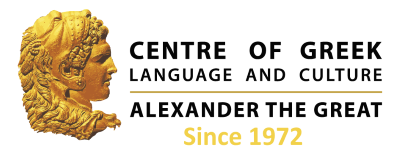In general
Ancient Greek is, without a doubt, a language – vehicle of culture with a highly esteemed presence in Classical Studies, which is why it is still taught in many schools and universities all around the world. Annually, the Hellenic Language School “Alexander the Great” has many students that have studied Ancient Greek (students or graduates of classical schools). At the same time, the School collaborates with many European classical schools, either directly, or through theOrganization for the Internationalisation of Greek Language and EUROCLASSICA, in order to aid students who already know Ancient Greek learn Modern Greek.
“A passage from Ancient to Modern Greek” is aimed at students and alumni of classical schools and also at anyone who is interested, abroad and in Greece as well, in learning Modern Greek and already has some basic knowledge of the ancient language. The book focuses on teaching grammatical phenomena and vocabulary of Modern Greek,
which is approached in comparison to Ancient Greek, while it also includes many exercises to practice and revise. The texts chosen for each unit gradually advance, as much as possible, from the ancient to the byzantine and modern Greek times, so as todemonstrate the unity of the language through the centuries.
“A passage from Ancient to Modern Greek” was part of the European Programme Socrates (229746-CP-1-GR-LINGUA-L2) and was developed by a team of Educational Organizations (Liceo Classico Statale “G.Mazzini” – Italy,Catholic University of Leuven – Belgium, Instituto de E. Secundaria “Carlos III” – Spain, BG Hartberg – Austria,National High school for ancient languages and cultures “St. Constantine Cyril the Philosopher” – Bulgaria,ELEA Ltd Computer Systems – Greece) with the coordination of the British – Hellenic Educational Development Association and, especially, of the Hellenic language school “Alexander the Great”.
Description of the book
“A passage from Ancient to Modern Greek” is a book for beginner students of the Modern Greek language (A1 – A2 level) who have a basic knowledge of Ancient Greek. It consists of 24 units, as presented in the list below:
| Units | |
|---|---|
|
|
Each unit includes:
- a text in Ancient Greek (with a translation in Modern Greek) and vocabulary (with notes of the etymology or the use of some words in the text and the equivalent Modern Greek word, as well as derivatives in the modern language)
- a text in Modern Greek (with a content relevant to the previous ancient text) and vocabulary (with notes of the etymology or the use of some words in the text and the equivalent Ancient Greek word, as well as derivatives in the modern language)
- comprehension and vocabulary exercises
- grammatical theory (we present in juxtaposition modern and ancient grammatical and syntactical phenomena) and exercises
- word games (crossword puzzle, hangman, picture and word)
This educational material is available in printed form, multimedia cd, as well as on
the internet. It also needs to be noted that a translation of the vocabulary and the
instructions to the exercises of the multimedia cd is available in Spanish, Italian,
German, Flemish and Bulgarian.
